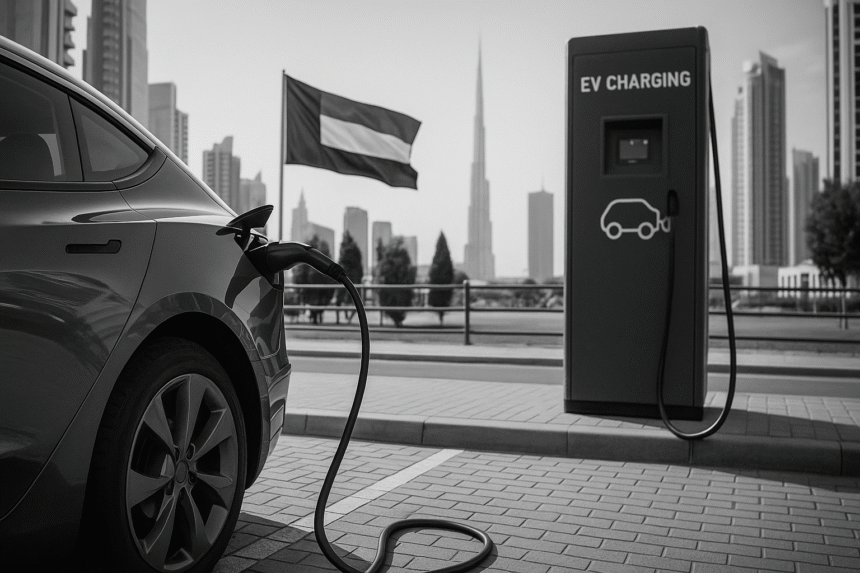What Is the Price of EV Charging in the UAE? A 2025 Executive Guide
As electric vehicles (EVs) gain traction across the Gulf, one question continues to surface for fleet managers, infrastructure investors, and real estate developers: What is the current EV charging price in the UAE—and what shapes it?
In this post, we break down DEWA and ADDC pricing structures, compare AC and DC charger rates, and highlight how subsidies and public-private business models impact pricing for both operators and end users.
DEWA and ADDC Pricing Schemes: What to Expect in 2025
In the UAE, EV charging rates vary based on location, charger type, and operator—especially when comparing Dubai and Abu Dhabi.
DEWA Pricing (Dubai)
-
Standard rate: AED 29 fils per kilowatt-hour (kWh)
-
Applies to most public Green Chargers operated by DEWA
-
Free charging was offered to registered EV users between 2017 and 2021. This has now transitioned to a paid model
ADDC Pricing (Abu Dhabi)
-
No fixed public statement on rate yet; rates may vary by location and operator (especially if ADNOC or private operators are involved)
-
Typical commercial DC fast-charging rates can reach AED 50 fils/kWh depending on demand and speed
Both utilities allow private operators to set custom pricing, provided the rate does not conflict with grid regulations.
AC vs. DC Charger Rates: What’s the Difference?
EV charging price in the UAE also depends on the type of charger being used.
AC Chargers (Slow to Medium Speed)
-
Usually 7kW to 22kW
-
Charging time: 4 to 8 hours for a full charge
-
Ideal for malls, offices, and residential buildings
-
Commonly priced at 29 to 35 fils/kWh
DC Chargers (Fast or Ultra-Fast)
-
50kW to 350kW
-
Charging time: 15 to 60 minutes
-
Often placed at fuel stations, public roadsides, and highway rest stops
-
Priced higher—40 to 50 fils/kWh or more, depending on operator cost structure and location
Keep in mind: Some DC chargers are subscription-based or apply idle fees for vehicles that overstay after reaching full charge.
Private vs. Government-Operated Pricing
Who owns and operates the charging station can heavily influence the pricing strategy.
Government-Owned Chargers (e.g., DEWA, Abu Dhabi Municipality)
-
Transparent, regulated pricing
-
Focused on policy alignment and EV adoption
-
Subject to grid stability and subsidy decisions
Private Operators (e.g., Shabik, GreenParking, or building owners)
-
More flexible pricing models:
-
Free for tenants or staff
-
Hourly access fees
-
Dynamic pricing based on demand and time of day
-
-
Can bundle charging into property services or parking access
Many private providers use smart platforms that allow pre-booking, wallet recharge, and price visibility via mobile apps—improving transparency and customer trust.
Subsidies and Green Initiatives: Are EV Drivers Getting Support?
While direct charging subsidies have declined post-2021, the UAE government continues to support EV growth through:
-
Import duty waivers for EVs
-
Free registration or parking incentives
-
Strategic grid upgrades to support public and commercial fast charging
These incentives lower total ownership costs, even if charging is now fully priced. Furthermore, developers of commercial buildings may benefit from grants or project partnerships when integrating EV infrastructure into green-certified developments.
Example Use Case: Mixed-Use Tower in Dubai Marina
Imagine a developer operating a high-rise tower with:
-
3 AC wallboxes in the basement (22kW each)
-
1 DC fast charger in the visitor lot (50kW)
They could apply a tiered charging model:
-
Free first hour for residents (subsidized by HOA)
-
AED 35 fils/kWh for guests
-
AED 50 fils/kWh for the fast charger
-
Penalty charge of AED 10/hour for vehicles left plugged in beyond full charge
Such a setup aligns with both user satisfaction and energy management goals.
Conclusion: EV Charging Price UAE Outlook in 2025
The EV charging price in the UAE continues to evolve with market maturity, infrastructure rollouts, and policy updates. For CEOs and infrastructure developers, pricing strategy is more than cost recovery—it’s part of your long-term mobility, energy, and sustainability roadmap.
Key takeaways:
-
Standard DEWA rate: AED 29 fils/kWh (AC public chargers)
-
Private DC rates: AED 40–50 fils/kWh, with app-based billing and idle fees
-
Hybrid pricing models allow creative monetization in real estate and hospitality
-
Subsidies still exist, just not at the charging station level
By planning for scalable pricing structures and integrating smart software, businesses can offer EV charging that is user-friendly, profitable, and future-ready.



Leave a Reply